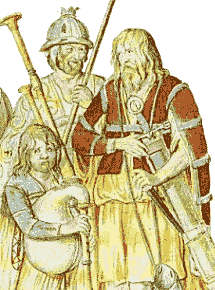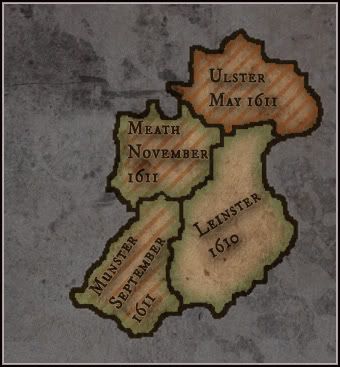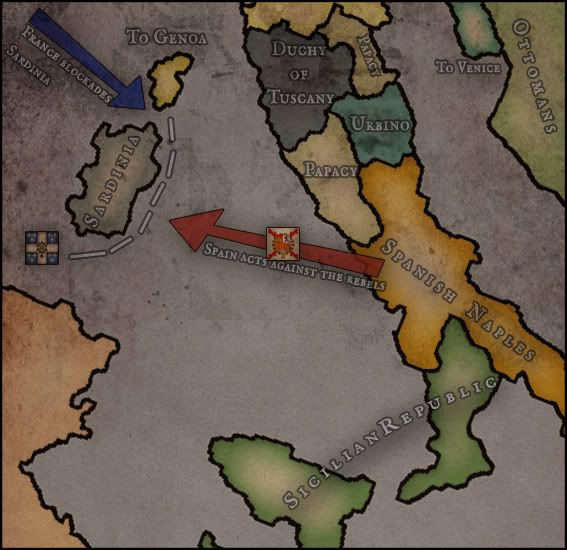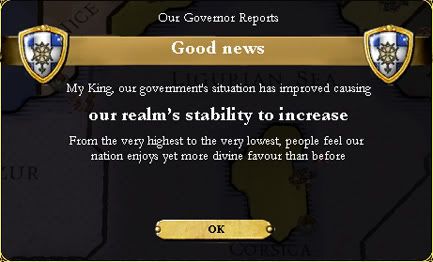Chapter XIX – The Three Marshals
***
The Will of a Lion
***
King Henri was carried by a forest of hands from the walls of Ayr and with the greatest affection, laid on a couch covered with captured colours and pleasant cloth. Physicians were summoned and could quickly pronounce that the king had not died from his wound, but was unconscious and extremely weakened. A constant watch was kept over the king and around the gloomy Huguenot camp, the soldiers gathered around their bonfires in constant prayer for the life of their sovereign.
After a day of vigilance the king awoke and was able to speak to his siegneurs. Sully had already hurried over from the continent and was travelling north as fast as he could. Sully knew that although the sovereign had survived it was unlikely for the king to last long.
Henri himself knew this very well and even though the slightest upsetting could possible lead to his death, he gave the order to move the army south, away from Scotland and into England. The king thus began what would become his last journey home.
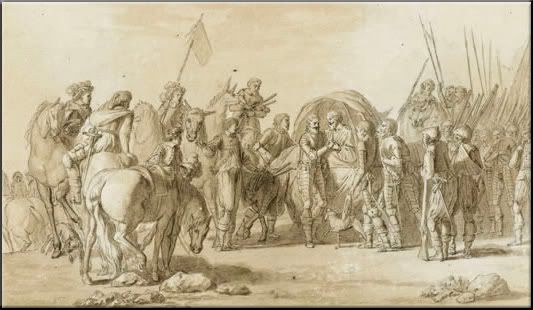
Henri being transported south in the lead of the Army of Flanders
Although Henri had done much to strengthen the position of both the Huguenots and the Bourbon royal house, he knew that without a firm and strong leader to govern France after his death, the country would risk yet another round of excruciating civil wars. Sadly, none of Henri’s children were old enough to directly take over the throne. The Dauphin, Louis, was only 8 years old and nowhere near being ready to rule a country as vast and powerful like France. Thus it was of unrivalled importance for Henri to discuss the succession with Sully and his chief supporters before he would leave the mortal world. The public opinion back home in France wasn’t exactly ideal either for a bloody war over control for France. Although the Huguenots held absolute majority many ministers reported that a great deal of the converts had a hard time abjuring their old corrupt Roman faith. The earth was there for the League to plant treachery in and the Habsburgs would undoubtedly support them if they rose against a France roaming leaderless. It was to counter these threats that Sully hastened to the side of Henri to draft the single document that would save France from Anarchy, the will of Henri IV.
***
Regency of the Three Marshals
***
When Sully arrived at the camp of the Army of Flanders just outside Oxford, he wasted no time to seek out the king. He made his way through the gigantic camp of tents erected in the green countryside and arrived at the king’s side in late May; two weeks after Henri had been wounded at Ayr. There Henri bestowed upon him the rank of marshal of France and tasked him with the authority to form a regency to take care both of France and the royal family until the Dauphin could rule. Henri declared three goals for Sully to do in order to secure France;
1) Secure a stable administration
2) Win over the army
3) Gain international recognition
Several weeks passed before, finally, the king gave up his spirit surrounded by the men he loved the most; the grim and pious troopers of Huguenot France. In the hot air of the warm summer night on the 14th of July Sully and the siegneurs and commanders present called the army together in its entirety and pronounced the death of the king. The Army of Flanders promptly swore allegiance to Sully and the office of guardian Henri had granted him. Black banners of mourning went up all around the camp and grief wrecked psalms rose to the ever blue summer skies of England. When the news of the French king’s passing reached London King James immediately left for Oxford in order to present Sully with his greatest sympathies and condolences. Furthermore the English sovereign swore on the coffin of Henri a vow of undying friendship between the kingdom of England-Scotland and France and promised to back Sully as the rightful leader of the regency against any opposition back home in France. Sully didn’t need to worry about any Catholic insurrection. By the death of Henri, the Catholics had been reduced to few enclaves in Provence, Girona, the French Netherlands and lastly Paris.

Religion in France, 1610
Although Sully returned home to France with English support, a massive and well trained army and, almost more importantly, the body of Henri, he could not be certain that the rest of France immediately would support him as the guardian of France. The majority of Huguenot siegneurs saw him as an opportunistic and greedy old man whose only intent was to tap as much money from the French state budget as possible into his own pockets. To counter this, Sully needed allies. The great marshal of France Francois de Bonne (who had led a marvellous defence of Southern France during the first war with the Habsburgs) was brought into the regency because of his stunning military record and promised command of the kingdom’s armies. By doing this Sully had secured the militant faction of the Huguenot court. They were deeply assured that even though the administrator Sully would run the regency, the advice of de Bonne would hold a significant sway within the new government. Sully now had two of the three goals secured. De Bonne symbolized the submission of the military and he could himself run a competent administration. All that was left was to find someone talented enough on the diplomatic stage. The choice fell upon Henri duc de Rohan, also marshal of France and a former Huguenot commander who had enjoyed the friendship of the late Henri. After the end of his military career, the duc de Rohan had extensively travelled through Europe and had, amongst other things, a great relationship to the house of Stuart, as he was godfather to the heir to the English throne. Besides his knowledge of the international scene Rohan was also held in high esteem by many of the Huguenot nobles, because of his former importance in the wars of religion. Indeed, for a time he was the natural leader of the French Protestants after Henri IV and Admiral Coligny [1]. With a competent regency instituted, the three marshals of France were ready to take any problems head on.
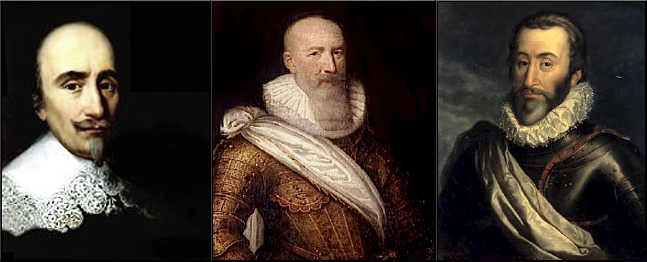
The Three Marshals. From left to right: Henri, duc de Rohan; the duc de Sully, leader of the Regency and lastly Francois de Bonne
[1]this is all correct OT
***
The Will of a Lion
***
King Henri was carried by a forest of hands from the walls of Ayr and with the greatest affection, laid on a couch covered with captured colours and pleasant cloth. Physicians were summoned and could quickly pronounce that the king had not died from his wound, but was unconscious and extremely weakened. A constant watch was kept over the king and around the gloomy Huguenot camp, the soldiers gathered around their bonfires in constant prayer for the life of their sovereign.
After a day of vigilance the king awoke and was able to speak to his siegneurs. Sully had already hurried over from the continent and was travelling north as fast as he could. Sully knew that although the sovereign had survived it was unlikely for the king to last long.
Henri himself knew this very well and even though the slightest upsetting could possible lead to his death, he gave the order to move the army south, away from Scotland and into England. The king thus began what would become his last journey home.

Henri being transported south in the lead of the Army of Flanders
Although Henri had done much to strengthen the position of both the Huguenots and the Bourbon royal house, he knew that without a firm and strong leader to govern France after his death, the country would risk yet another round of excruciating civil wars. Sadly, none of Henri’s children were old enough to directly take over the throne. The Dauphin, Louis, was only 8 years old and nowhere near being ready to rule a country as vast and powerful like France. Thus it was of unrivalled importance for Henri to discuss the succession with Sully and his chief supporters before he would leave the mortal world. The public opinion back home in France wasn’t exactly ideal either for a bloody war over control for France. Although the Huguenots held absolute majority many ministers reported that a great deal of the converts had a hard time abjuring their old corrupt Roman faith. The earth was there for the League to plant treachery in and the Habsburgs would undoubtedly support them if they rose against a France roaming leaderless. It was to counter these threats that Sully hastened to the side of Henri to draft the single document that would save France from Anarchy, the will of Henri IV.
***
Regency of the Three Marshals
***
When Sully arrived at the camp of the Army of Flanders just outside Oxford, he wasted no time to seek out the king. He made his way through the gigantic camp of tents erected in the green countryside and arrived at the king’s side in late May; two weeks after Henri had been wounded at Ayr. There Henri bestowed upon him the rank of marshal of France and tasked him with the authority to form a regency to take care both of France and the royal family until the Dauphin could rule. Henri declared three goals for Sully to do in order to secure France;
1) Secure a stable administration
2) Win over the army
3) Gain international recognition
Several weeks passed before, finally, the king gave up his spirit surrounded by the men he loved the most; the grim and pious troopers of Huguenot France. In the hot air of the warm summer night on the 14th of July Sully and the siegneurs and commanders present called the army together in its entirety and pronounced the death of the king. The Army of Flanders promptly swore allegiance to Sully and the office of guardian Henri had granted him. Black banners of mourning went up all around the camp and grief wrecked psalms rose to the ever blue summer skies of England. When the news of the French king’s passing reached London King James immediately left for Oxford in order to present Sully with his greatest sympathies and condolences. Furthermore the English sovereign swore on the coffin of Henri a vow of undying friendship between the kingdom of England-Scotland and France and promised to back Sully as the rightful leader of the regency against any opposition back home in France. Sully didn’t need to worry about any Catholic insurrection. By the death of Henri, the Catholics had been reduced to few enclaves in Provence, Girona, the French Netherlands and lastly Paris.

Religion in France, 1610
Although Sully returned home to France with English support, a massive and well trained army and, almost more importantly, the body of Henri, he could not be certain that the rest of France immediately would support him as the guardian of France. The majority of Huguenot siegneurs saw him as an opportunistic and greedy old man whose only intent was to tap as much money from the French state budget as possible into his own pockets. To counter this, Sully needed allies. The great marshal of France Francois de Bonne (who had led a marvellous defence of Southern France during the first war with the Habsburgs) was brought into the regency because of his stunning military record and promised command of the kingdom’s armies. By doing this Sully had secured the militant faction of the Huguenot court. They were deeply assured that even though the administrator Sully would run the regency, the advice of de Bonne would hold a significant sway within the new government. Sully now had two of the three goals secured. De Bonne symbolized the submission of the military and he could himself run a competent administration. All that was left was to find someone talented enough on the diplomatic stage. The choice fell upon Henri duc de Rohan, also marshal of France and a former Huguenot commander who had enjoyed the friendship of the late Henri. After the end of his military career, the duc de Rohan had extensively travelled through Europe and had, amongst other things, a great relationship to the house of Stuart, as he was godfather to the heir to the English throne. Besides his knowledge of the international scene Rohan was also held in high esteem by many of the Huguenot nobles, because of his former importance in the wars of religion. Indeed, for a time he was the natural leader of the French Protestants after Henri IV and Admiral Coligny [1]. With a competent regency instituted, the three marshals of France were ready to take any problems head on.

The Three Marshals. From left to right: Henri, duc de Rohan; the duc de Sully, leader of the Regency and lastly Francois de Bonne
[1]this is all correct OT


